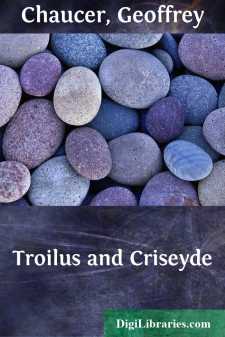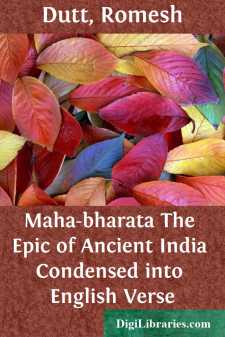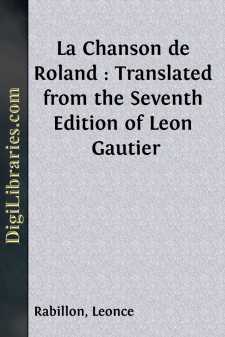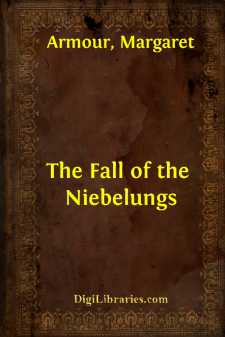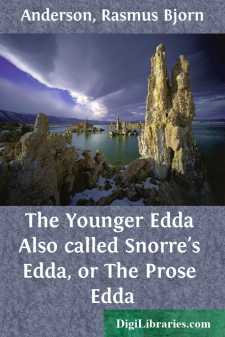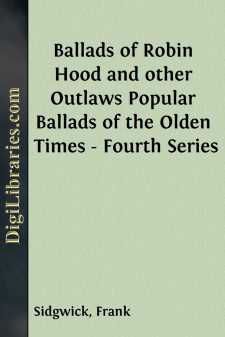Poetry
- American 96
- Ancient, Classical & Medieval
- Asian 15
- Australian & Oceanian 11
- Canadian 11
- Caribbean & Latin American 5
- Children's Poetry & Nursery rhymes 51
- Continental European 11
- English, Irish, Scottish, Welsh 162
- General 483
- Inspirational & Religious 7
- Middle Eastern 3
Ancient, Classical & Medieval Books
Sort by:
by:
Anonymous
I Charles the King, our Lord and Sovereign, Full seven years hath sojourned in Spain, Conquered the land, and won the western main, Now no fortress against him doth remain, No city walls are left for him to gain, Save Sarraguce, that sits on high mountain. Marsile its King, who feareth not God's name, Mahumet's man, he invokes Apollin's aid, Nor wards off ills...
more...
by:
Geoffrey Chaucer
BOOK I. Incipit Liber Primus The double sorwe of Troilus to tellen, 1That was the king Priamus sone of Troye,In lovinge, how his aventures fellenFro wo to wele, and after out of Ioye,My purpos is, er that I parte fro ye. 5Thesiphone, thou help me for tendyteThise woful vers, that wepen as I wryte! To thee clepe I, thou goddesse of torment,Thou cruel Furie, sorwing ever in peyne;Help me, that am the...
more...
by:
Romesh Dutt
The scene of the Epic is the ancient kingdom of the Kurus which flourished along the upper course of the Ganges; and the historical fact on which the Epic is based is a great war which took place between the Kurus and a neighbouring tribe, the Panchalas, in the thirteenth or fourteenth century before Christ. According to the Epic, Pandu and Dhrita-rashtra, who was born blind, were brothers. Pandu died...
more...
by:
Leonce Rabillon
PREFACE. Several years ago, the maker of this version translated into French one of the early works of H. W. Longfellow. This circumstance was not forgotten by the American poet who kindly consented to listen to this new attempt at rendering into English the "CHANSON DE ROLAND." To his encouragement is due the present publication. The writer will ever proudly treasure up the remembrance of his...
more...
by:
Margaret Armour
In old tales they tell us many wonders of heroes and of high courage, of glad feasting, of wine and of mourning; and herein ye shall read of the marvellous deeds and of the strife of brave men. There grew up in Burgundy a noble maiden, in no land was a fairer. Kriemhild was her name. Well favoured was the damsel, and by reason of her died many warriors. Doughty knights in plenty wooed her, as was meet,...
more...
PREFACE. In the beginning, before the heaven and the earth and the sea were created, the great abyss Ginungagap was without form and void, and the spirit of Fimbultyr moved upon the face of the deep, until the ice-cold rivers, the Elivogs, flowing from Niflheim, came in contact with the dazzling flames from Muspelheim. This was before Chaos. And Fimbultyr said: Let the melted drops of vapor quicken...
more...
by:
Lodovico Ariosto
This work is a continuation of the "Orlando Innamorato" of Matteo Maria Boiardo, which was left unfinished upon the author's death in 1494. It begins more or less at the point where Boiardo left it. This is a brief synopsis of Boiardo's work, omitting most of the numerous digressions and incidental episodes associated with these events: To the court of King Charlemagne comes Angelica...
more...
by:
Samuel Butler
Book I THE GODS IN COUNCIL—MINERVA'S VISIT TO ITHACA—THE CHALLENGE FROM TELEMACHUS TO THE SUITORS. Tell me, O Muse, of that ingenious hero who travelled far and wide after he had sacked the famous town of Troy. Many cities did he visit, and many were the nations with whose manners and customs he was acquainted; moreover he suffered much by sea while trying to save his own life and bring his...
more...
by:
William Cowper
BOOK I. Achilles sing, O Goddess! Peleus' son;His wrath pernicious, who ten thousand woesCaused to Achaia's host, sent many a soulIllustrious into Ades premature,And Heroes gave (so stood the will of Jove)5To dogs and to all ravening fowls a prey,When fierce dispute had separated onceThe noble Chief Achilles from the sonOf Atreus, Agamemnon, King of men. Who them to strife impell'd? What...
more...
by:
Frank Sidgwick
PREFACE This volume concludes the series, begun in 1903, which was intended to comprise all the best traditional ballads of England and Scotland. The scheme of classification by subject-matter, arbitrary and haphazard as it may seem to be at one point or another, has, I think, proved more satisfactory than could have been anticipated; and in the end I have omitted no ballad without due justification....
more...



